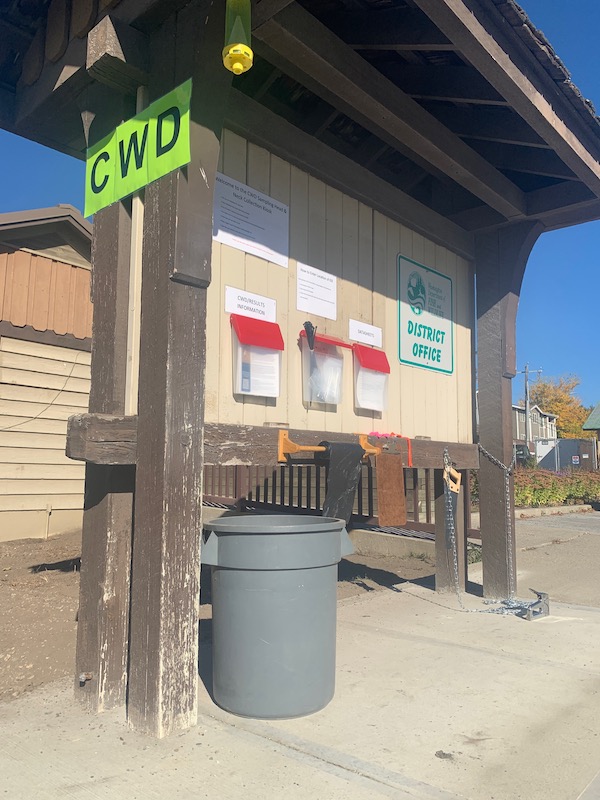
Washington Not Too Enthusiastic About Donating Wolves To Colorado
Washington wildlife overseers don’t appear too enthusiastic at the moment about donating wolves to Colorado for a voter-mandated wolf reintroduction effort in that state, but did express interest in at least hearing more about it.

The Fish and Wildlife Commission gave that direction to WDFW Director Kelly Susewind this afternoon after Colorado Parks and Wildlife Director Jeff Davis wrote to him last month about wanting to begin discussions.
In a separate decision today, members also gave Susewind authority to figure out a program that would incentivize hunters to turn in samples from their deer and elk for chronic wasting disease testing via a drawing for 100 multiseason special permit deer tags.
As for the commission’s cool response to former WDFW Conservation Director Davis, that appears to be related to an ongoing agency periodic status review of Washington’s gray wolves. WDFW is proposing to downlist the species to protected-sensitive, but with wolves currently listed as state endangered, there was a lot to think about first, said Chair Barbara Baker.
Colorado plans to translocate from 10 to 15 wolves a year for three to five years from federally delisted populations of the Northern Rockies, but if some of those were to come from Washington, would it slow population growth and meeting recovery region goals?
Or would it suggest that the downlisting could actually go even further if there are so many on the landscape that the state could give a few away?
The commission’s decision came after earlier discussion today in its Wildlife Committee. Committee Chair Lorna Smith said that given the PSR and a pending listing decision, scheduled for possibly later this year, it wasn’t an appropriate time but she didn’t want to close the door completely either.
She was supported by fellow committee members Woody Myers and Melanie Rowland.
But there were concerns from Baker, who said there hadn’t been enough discussions and said there was gossip that the Governor’s Office was interested in it.
An email to Governor Jay Inslee’s office about the nature of that interest was not immediately returned, but later in the day during public comment before the full commission, Ruth Muthgrave, his senior natural resources policy advisor, told members that there had been some level of talks between Inslee and Colorado Governor Jared Polis, but that “We don’t have an official position.”
That was reiterated later this afternoon by Inslee spokeswoman Jaime Smith.”Our office has spoken with Gov. Polis’s office about the possibility. We have not made any commitments or taken a position at this point but are open to the discussion.”
The Fish and Wildlife Commission’s Lorna Smith also indicated that she’d had a conversation with Colorado’s Davis about Washington wolves, and that gave Vice Chair Molly Linville a little “heartburn.” The Douglas County rancher said it seemed like unfair access to the other members of the commission.
Smith replied that Davis had actually approached her at a late May/early June wildlife conference held at Colorado State University because he knew she would be there to make a presentation. She said she’d made no commitments to him and made it clear it wasn’t her decision.
She was attending what’s known as Pathways 2023, a “very forward-thinking conference,” in her words, and this year’s theme was “managing wildlife in the era of mutualism.” Her presentation was on “Conservation of What, Management for Whom? Wildlife Governance as if Democracy and Extinction Mattered” with copresenters Samantha Bruegger of Washington Wildlife First and Kevin Bixby of Wildlife For All.
Colorado State would not make a video, transcript or PDF of the presentation available to non-conference goers.
If Davis and Colorado are unable to acquire Washington wolves, that leaves Oregon, Montana and Idaho as possible donor states. The governor of Wyoming has flatly refused doing so.
IN OTHER NEWS FROM TODAY’S Washington Fish and Wildlife Commission, members delegated to Director Susewind authority to come up with a program to encourage hunters this fall to submit their harvested deer or elk for chronic wasting disease.
Essentially, WDFW would put hunters who provide their harvests for testing into a drawing for 100 multiseason special permit deer tags for the 2024 season. A multiseason tag allows a hunter to try and fill their tag with a bow, muzzleloader or rifle. The annual limit would still be just one deer.
CWD is NOT known to be in Washington ungulates, but with 2021’s discovery of it in deer and elk in Idaho south of Lewiston in Hells Canyon where the three Northwest states come together, WDFW has increased its collection of harvested and roadkilled deer for testing, including installing a self-service station in Colville last season.

But it’s not been enough to meet sampling goals, Wildlife Program Manager Eric Gardner told the commission, so the agency wants to try this incentivized approach.
With zero ability to treat the deer, elk and moose disease that’s 100 percent fatal and which can lead to population declines, the Evergreen State’s absolute best bet is early detection and prevention, and it behooves hunters to help that effort as much as possible.

